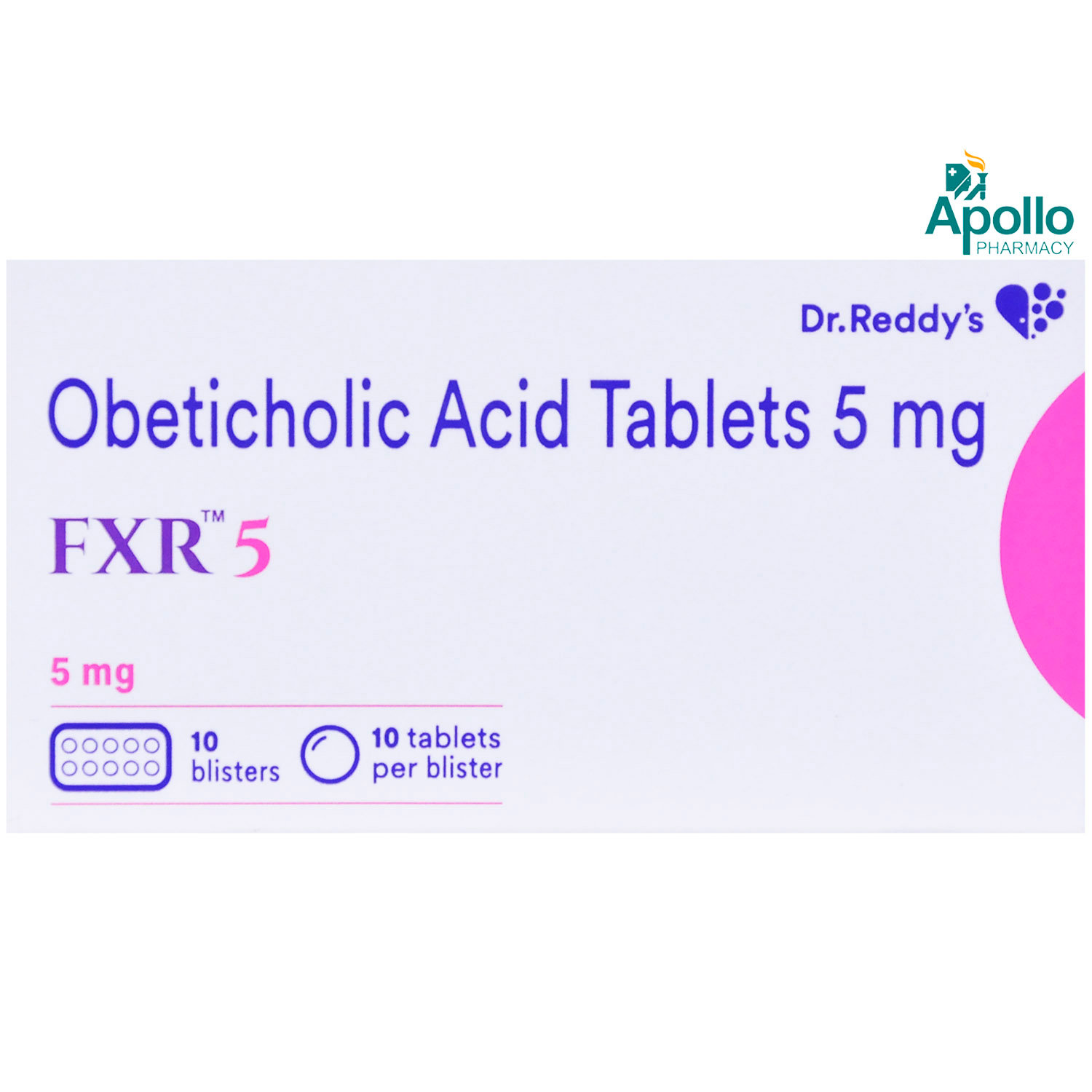Obeticholic Acid
About Obeticholic Acid
Obeticholic Acid belongs to a group of medicines called Farnesoid X-receptor agonists used to treat primary biliary cirrhosis. Primary biliary cholangitis, also known as primary biliary cirrhosis, is an autoimmune disease caused by damage of bile ducts in the liver. Biliary cirrhosis causes a build-up of bile in the liver, which leads to liver damage.
Obeticholic Acid contains ‘Obeticholic acid’, which helps improve liver functioning by reducing the production and build-up of bile in the liver, increases the removal of bile from the liver, and reduces inflammation, thereby helps treat primary biliary cirrhosis.
Take Obeticholic Acid as prescribed. In some cases, you may experience common side effects such as stomach pain, tiredness, dizziness, constipation, and palpitations. Most of these side effects do not require medical attention and will resolve gradually over time. However, you are advised to talk to your doctor if the side effects persist or worsen.
Consult your doctor if you are pregnant or breastfeeding. Obeticholic Acid is not recommended for children and adolescents. Obeticholic Acid may cause dizziness, so drive with caution. It is unknown if alcohol interacts with Obeticholic Acid; consult your doctor if you have any concerns. Keep your doctor informed about your health condition and medicines to rule out any side effects.
Uses of Obeticholic Acid
Medicinal Benefits
Obeticholic Acid belongs to a group of medicines called farnesoid X-receptor agonists used to treat primary biliary cirrhosis/primary biliary cholangitis. Obeticholic Acid helps improve liver functioning by reducing the production and build-up of bile in the liver and reduces inflammation, thereby helps treat primary biliary cirrhosis.
Directions for Use
Storage
Side Effects of Obeticholic Acid
- Stomach pain
- Tiredness
- Dizziness
- Palpitations (irregular or fast heartbeat)
- Constipation
- Thyroid hormone irregularity
Drug Warnings
Do not take Obeticholic Acid if you are allergic to any of its contents; if you have a complete blockage of the biliary tract (liver, bile ducts, and gall bladder). Inform your doctor if you experience itching that is difficult to tolerate. Consult your doctor if you are pregnant or breastfeeding. Obeticholic Acid is not recommended for children or adolescents. Obeticholic Acid may cause dizziness, so drive with caution. Consult a doctor immediately if you experience yellowing of the skin/eyes, black/tarry stools, dark urine, coughing up/vomiting blood, confusion, slurred speech, mood swings, anxiety, swelling in and around the stomach.
Drug Interactions
Drug-Drug Interactions: Obeticholic Acid may interact with xanthines (theophylline), muscle relaxants (tizanidine), blood thinners (warfarin), bile acid sequestrants (cholestyramine, colestipol, colesevelam).
Drug-Food Interactions: No interactions found/established.
Drug-Disease Interactions: Inform your doctor if you have biliary obstruction, liver impairment, or lipid disorder.
Drug-Drug Interactions Checker List:
Safety Advice

Alcohol
cautionIt is not known if alcohol interacts with Obeticholic Acid. Consult your doctor if you have any concerns.

Pregnancy
cautionPlease consult your doctor if you are pregnant, as limited information is available regarding the usage of Obeticholic Acid during pregnancy.

Breast Feeding
cautionConsult your doctor if you are breastfeeding; your doctor will decide whether Obeticholic Acid can be taken by breastfeeding mothers or not.

Driving
safe if prescribedObeticholic Acid does not affect your ability to drive. However, you are advised to omit driving if you experience dizziness.

Liver
cautionDose adjustment may be needed. Please consult your doctor if you have a liver impairment or any concerns regarding this. Inform your doctor if you have/had liver cirrhosis.

Kidney
cautionPlease consult your doctor if you have kidney impairment or any concerns regarding this.

Children
unsafeObeticholic Acid is not recommended for children or adolescents.
Habit Forming
Diet & Lifestyle Advise
- Include foods such as bell peppers, citrus fruits, leafy vegetables, tomatoes, milk, fish, low-fat dairy, beans, nuts, lentils, tofu and tempeh.
- Eat a healthy, well-balanced diet that includes fruits and vegetables.
- Avoid high-fat, trans-fat, and processed foods.
- White bread, white pasta and sugars should be avoided.
- Avoid tobacco and alcohol consumption.
Special Advise
- Regular blood tests for monitoring liver functioning are advised.
Patients Concern
Disease/Condition Glossary
Primary biliary cholangitis: Primary biliary cholangitis, also known as primary biliary cirrhosis, is an autoimmune disease caused by damage to bile ducts in the liver. Bile ducts are the small channels that carry the bile (digestive fluid) from the liver to the small intestine, where it breaks down fats and aids in its absorption. Biliary cirrhosis causes a build-up of bile in the liver, which leads to liver damage.
FAQs
Obeticholic Acid helps improve liver functioning by reducing the production and build-up of bile in the liver and reduces inflammation.
Do not discontinue Obeticholic Acid without consulting your doctor. To treat your condition effectually, continue taking Obeticholic Acid for as long as prescribed. Do not be reluctant to speak with your doctor if you experience any difficulty while taking Obeticholic Acid.
Constipation might be a side-effect of Obeticholic Acid. Drink lots of fluids and eat fibre-rich food if you experience constipation. Talk to your doctor if you have severe constipation.
Consult your doctor before taking Obeticholic Acid along with bile acid-binding resins, as they might lower the effect of Obeticholic Acid. If prescribed, maintain a gap of 4-6hours between Obeticholic Acid and bile acid-binding resins. Bile acid-binding resins are used to lower blood cholesterol levels.
Obeticholic Acid may cause palpitation, a sensation that the heart is racing, pounding, or fluttering. A minor fluctuation should not be a worry; however, if palpitations continue or you begin to feel unwell, speak with your doctor.







